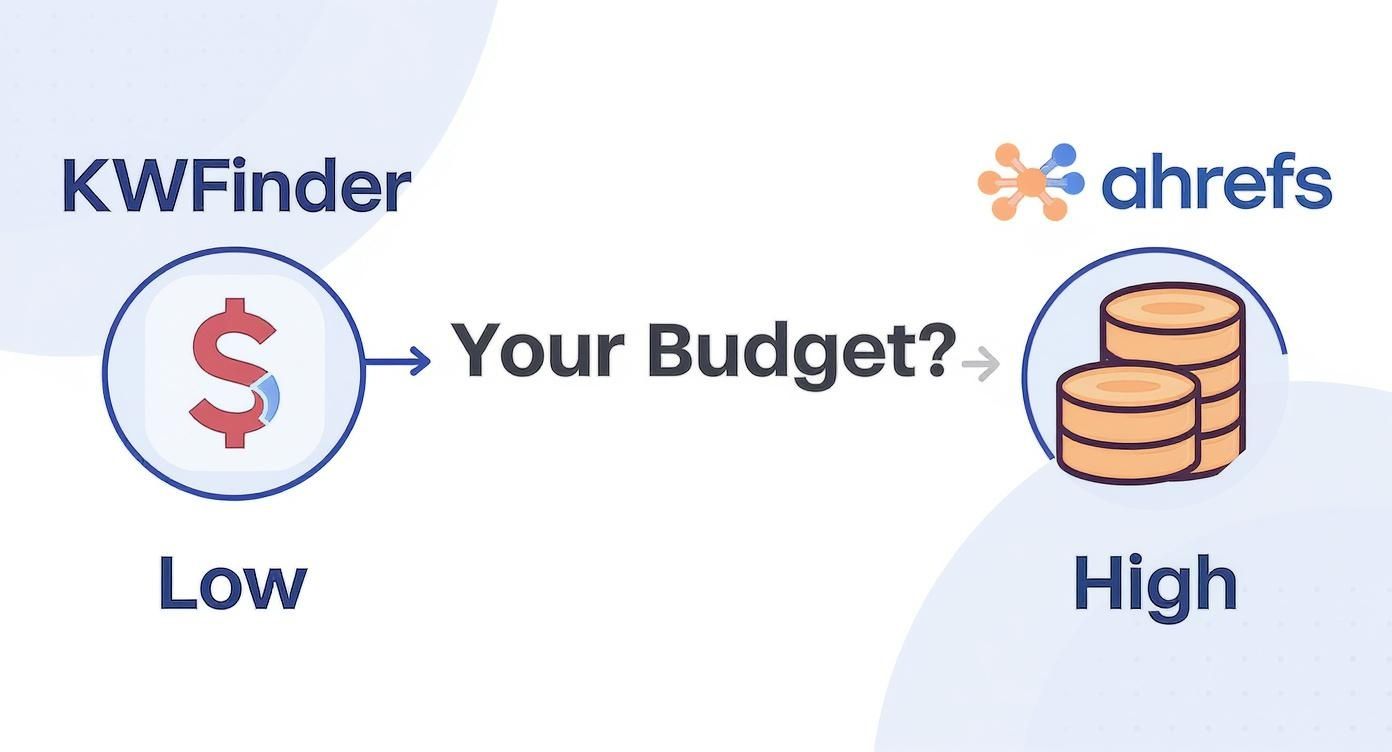Deciding between Ahrefs and KWFinder really comes down to what you need and how much you're willing to spend. It’s a classic powerhouse vs. specialist matchup. If you're an SEO pro juggling complex, data-heavy campaigns that demand deep backlink analysis and technical audits, Ahrefs is the undisputed industry leader. It's the whole package.
But if your main game is finding great keywords without getting bogged down by a million features or a steep price tag, KWFinder is a no-brainer. It’s built for efficiency.
Comparing Two Leading SEO Tools
Choosing the right SEO tool can feel like a huge commitment, but it’s simpler when you match the features to your actual business goals. Ahrefs is a full-blown toolkit designed for agencies and in-house teams. Think of it as the Swiss Army knife for SEO—it handles competitive analysis, content strategy, and technical site health all in one place.
On the other side, you have KWFinder, which is part of the Mangools suite. It’s not trying to do everything. Instead, it focuses on one thing and does it exceptionally well: helping you find low-competition keywords quickly and easily. It’s celebrated for its simplicity and accuracy.
This guide is designed to cut through the marketing noise and give you a straight-up comparison. We’ll go beyond just listing features to show you how each tool actually performs in the real world. By the end, you’ll have a clear idea of which investment makes sense for you, whether you’re a solopreneur, an Omaha small business owner, or part of a bigger marketing team.
At-a-Glance: Ahrefs vs KWFinder
Before we get into the nitty-gritty, this quick table sums up the core differences between the two platforms. Think of it as the high-level takeaway.
| Attribute | Ahrefs | KWFinder |
|---|---|---|
| Ideal User | SEO agencies, in-house marketing teams, and enterprises needing deep, multifaceted data. | Freelancers, SMBs, content creators, and bloggers focused on efficient keyword discovery. |
| Core Focus | An all-in-one SEO platform with industry-leading backlink analysis, site audits, and rank tracking. | A specialized, highly intuitive keyword research tool with excellent SERP analysis features. |
| Data Scale | Massive, proprietary database covering trillions of links and billions of keywords for granular analysis. | Relies on proven data sources with a focus on delivering accurate, actionable keyword metrics quickly. |
| Value Proposition | A premium investment for a consolidated suite that replaces multiple specialized tools. | An affordable, high-value solution for mastering the critical task of keyword research. |
This table immediately shows you where each tool shines. Ahrefs offers incredible depth and breadth for users who can actually put its full power to work. KWFinder, on the other hand, delivers fantastic usability and value for anyone whose primary focus is nailing their keyword strategy.
Now, let's dive deeper into the specific features that really set them apart.
Diving Into Core Keyword and SERP Analysis
Once you get past the feature lists, the real difference between Ahrefs and KWFinder shows up in how they handle the day-to-day grind of keyword and SERP analysis. This is where you either find a smooth workflow or hit a wall of frustration. It’s not just about the data you get; it’s about how that data is presented and what it lets you do.
Ahrefs operates on a scale that's almost hard to wrap your head around. Its keyword database is massive. For any seed keyword you plug in, it can dig up thousands of long-tail variations, questions, and related terms. This kind of depth is a huge plus for big-picture content strategies where you’re trying to build out comprehensive topic clusters.
KWFinder, on the other hand, is all about clarity and speed. It gives you a curated list of the most relevant, actionable keyword suggestions. This makes it incredibly efficient for small businesses, solopreneurs, or an Omaha-based publisher who just needs to find profitable local keywords without spending all day sifting through data.
Search Volume and Keyword Suggestions
The heart of any keyword tool is its ability to nail search volume and spit out useful suggestions. Ahrefs' Keywords Explorer is a data powerhouse. It gives you more than just search volume—it shows clicks data, global volume, and extensive keyword idea reports. You can get incredibly granular with your analysis.
Just look at the sheer volume of keyword ideas Ahrefs generates, broken down into multiple categories like "Matching terms" and "Related terms."

This screenshot gives you a sense of how Ahrefs lays everything out—difficulty scores, global volume, SERP features—all in one comprehensive view. It's exactly what you need for a detailed competitive review.
KWFinder takes a more focused route. Its database isn't as huge, but the suggestions are often more directly relevant, especially for niche topics. The interface is built to be understood in seconds, using color-coding and a clean layout to help you spot opportunities fast. For a baseline, it’s always smart to see how these tools stack up against the free options like Google's Keyword Planner.
The fundamental difference is really about philosophy. Ahrefs gives you a raw, exhaustive dataset for experts to mine for insights. KWFinder refines that data into something more digestible, guiding you toward the most promising keywords with less manual work.
The sheer scale of Ahrefs' database is something to behold, boasting over 12 trillion links in its index, which gives marketers an exhaustive view of the web. This makes it a beast for cluster-based content strategies. KWFinder's strength is its simplicity and user-friendly design. You can dig into what this data disparity means for your strategy by checking out a detailed Ahrefs vs KWFinder comparison.
Keyword Difficulty and SERP Analysis
Both tools offer a "Keyword Difficulty" (KD) score, but they don't calculate it the same way. Ahrefs' KD is famously based on the backlink profiles of the top-ranking pages. It's a reliable metric, but it can also be a tough one to beat. KWFinder's score pulls in a wider range of on-page and off-page factors, which some people find more intuitive for judging the overall chance of ranking.
When you get to SERP analysis, the difference is even clearer:
- Ahrefs SERP Overview: You get a dense, data-rich table showing key metrics for each of the top 10 results—Domain Rating (DR), URL Rating (UR), number of backlinks, and estimated traffic. It’s perfect for a deep-dive analysis.
- KWFinder SERP Overview: This is a more visual, color-coded breakdown of the SERP. It highlights metrics like Domain Authority (DA), Page Authority (PA), and link strength in a way that lets you size up the competition at a glance.
Ahrefs is ultimately built for the analyst who needs to dig deep into competitor metrics. That level of detail is critical when you need to figure out exactly why your competitors are outranking you. To get the most out of this data, take a look at our guide on how to conduct competitor analysis, which can be powered by either tool. KWFinder, however, is designed for the strategist who needs a quick, reliable snapshot to make a fast decision on whether a keyword is worth going after.
Analyzing Backlink and Technical SEO Capabilities

Once you step outside of keyword research, the differences between Ahrefs and KWFinder get a lot sharper. This is really where Ahrefs flexes its muscles as a true all-in-one SEO suite, while KWFinder sticks to what it does best as a specialist tool inside the Mangools ecosystem. Your choice boils down to whether you need a Swiss Army knife or a really, really good scalpel.
Ahrefs gives you a deeply connected platform where keyword data, backlink profiles, and technical site health all talk to each other. Mangools, on the other hand, is more like a collection of separate-but-linked apps, each built for a specific job. That design choice makes a big difference in your workflow and how deep you can go with your analysis.
Backlink Analysis: The Main Event
For a lot of us in the SEO world, backlink data is everything when it comes to sizing up the competition. Ahrefs’ Site Explorer is pretty much the industry gold standard here. It runs on a massive scale, with a backlink index that’s constantly crawling the web, giving you an almost real-time look at what your competitors are doing with their link-building.
You can really pick apart a competitor's profile with incredible detail, looking at things like:
- Referring Domains: See every single unique website that’s linking to a competitor.
- Anchor Text Distribution: Figure out the exact words other sites are using to link to your competition.
- Link Velocity: Keep tabs on how fast they’re getting new backlinks.
- "Best by links" Report: Quickly find the most powerful, link-worthy pages on a competitor's site.
This kind of depth is priceless if you're trying to reverse-engineer a successful link-building strategy or find some high-quality sites for outreach.
Over in the Mangools suite, you’ve got LinkMiner for backlink analysis. LinkMiner is built for speed and a simpler workflow—it’s more for quick checks than exhaustive deep dives. It’s fantastic for quickly sizing up the backlink profile of a single URL, showing you the most important metrics in a clean, visual way. It might not have the colossal index of Ahrefs, but it's super effective for finding a competitor's top links without getting buried in data.
An agency in Omaha managing a dozen client campaigns would find Ahrefs’ ability to spot small shifts in competitor link profiles a huge strategic plus. A blogger using KWFinder, though, can fire up LinkMiner, find the top 10-20 links pointing to a rival article, and have a targeted outreach plan ready in minutes.
Technical SEO and Site Audits
Technical SEO is another area where that "suite vs. specialist" dynamic in the ahrefs vs kwfinder debate becomes obvious. Ahrefs’ Site Audit tool is a powerful crawler that can flag hundreds of potential on-page and technical issues, from broken links and slow pages to tricky hreflang tag errors. It spits out detailed reports with clear, actionable steps to improve your site’s overall health. A strong technical foundation is a must, and our guide on how to optimize your website for search engines can help you put these insights to work.
The Mangools suite doesn't have a direct, one-to-one replacement for a full-scale site audit. Instead, its SiteProfiler tool gives you a high-level snapshot of a site's authority and backlink profile. Beyond the keyword and SERP metrics, checking your site's overall health often means using dedicated tools for comprehensive SEO score checking to catch technical problems or backlink opportunities that a simple overview might miss.
At the end of the day, Ahrefs is built for people who need to manage the entire SEO process—from brainstorming keywords to fixing technical issues and running off-page campaigns—all in one place. Mangools, with KWFinder and its buddies, gives you a set of powerful, easy-to-use tools that are great at their individual jobs but make you do a bit more manual work to connect the dots for the full SEO picture.
Diving Into User Experience and Workflow Efficiency
Beyond the raw data and fancy features, the real test of an SEO tool is how it feels to use it every day. The way a platform lays out information and guides you through a task can make or break your efficiency—and honestly, your sanity. This is where Ahrefs and KWFinder really part ways, as each tool is built on a completely different design philosophy.
Ahrefs is clearly built for the seasoned SEO pro who wants to see everything at once. Its interface is packed with data, dashboards, filters, and reports, all accessible from pretty much any screen. It's incredibly powerful and customizable, but it comes with a steep learning curve that can feel like drinking from a firehose for newcomers.
On the other hand, KWFinder and the rest of the Mangools suite are all about simplicity and visual clarity. The workflow is intuitive from the moment you log in, guiding you through keyword research with clean layouts and color-coded metrics. This makes it a perfect starting point for beginners or marketers who just need quick, reliable answers without getting bogged down in complex menus.
The KWFinder Workflow: A Visual First Approach
KWFinder’s whole design is centered around making keyword research as painless as possible. When you plug in a seed keyword, the main dashboard gives you the most critical info in a clean, easy-to-scan format. You get a list of keyword ideas on the left and a detailed SERP overview on the right, all on a single screen.
Here’s what you see right after a search in KWFinder.
This layout immediately shows you the keyword difficulty score, search volume trends, and the top-ranking pages without making you click through multiple reports. That visual, all-in-one view is the heart of its efficient workflow.
This approach is a great example of core user experience design best practices in action, where clarity and simplicity lead to faster, better decisions. For a small business owner in Omaha, this means you can spot a promising local keyword and size up the competition in minutes, not hours.
The Ahrefs Workflow: A Data-Driven Deep Dive
Ahrefs takes a completely different tack. Its workflow isn't a single, guided path; it's more like a comprehensive toolkit for deep exploration. The user experience is designed for power users who want to slice and dice data in a dozen different ways. For example, finding low-competition keywords might start in Keywords Explorer, then pivot to Site Explorer to analyze a competitor’s top pages, and finally use the Content Gap tool to see what they rank for that you don’t.
This multi-tool process is incredibly powerful but requires a solid grasp of SEO concepts to be truly effective. Each step opens up new layers of data, which is perfect for building complex, long-term strategies but can feel like overkill for simpler tasks.
The core difference in workflow is this: Ahrefs gives you a powerful, interconnected workshop full of specialized tools, expecting you to know how to use them together. KWFinder gives you a clean, organized assembly line designed for one specific task—keyword discovery.
Recent user satisfaction data highlights these different user bases. Aggregated reviews show Ahrefs holding a strong 4.5 out of 5 rating from over 500 reviews, with heavy adoption among mid-sized companies and larger enterprises. KWFinder scores a very respectable 4.4 out of 5, though from a much smaller sample size, suggesting a loyal but more niche following. If you want to see a full breakdown of the numbers, you can discover more insights about Ahrefs vs KWFinder user satisfaction.
Choosing Based on Price and Business Value
Let's be honest, the price tag is often the first thing people look at when picking an SEO tool. But the real story is about value. When you line up Ahrefs vs KWFinder, the decision isn't just about the monthly bill; it's about matching a tool's power and pricing model to your actual business goals, team size, and budget.
Ahrefs plays in the big leagues as a premium, all-in-one platform. KWFinder, on the other hand, delivers a ton of bang for your buck as a specialized, budget-friendly tool.
Ahrefs is, without a doubt, the more expensive of the two. Its entry-level "Lite" plan kicks off at $99 per month, and that price reflects its ambition to be the only SEO tool you need. For a growing Omaha agency or an in-house marketing team, this can be a smart move. You're bundling keyword research, backlink analysis, site audits, and rank tracking into one ecosystem instead of juggling multiple subscriptions.
The catch? Ahrefs recently moved to a credits system. Every report you pull or filter you add eats into your monthly credits. Power users or big teams can burn through these surprisingly fast, which means you have to keep a close eye on usage to avoid unexpected overage fees.
KWFinder's Compelling Value Proposition
This is exactly where KWFinder, part of the Mangools suite, becomes a no-brainer for freelancers, bloggers, and most small to mid-sized businesses. The Mangools "Basic" plan usually hovers around $29 per month if you pay annually. For that, you get KWFinder plus LinkMiner, SERPChecker, SERPWatcher, and SiteProfiler. It's a surprisingly capable toolkit for a fraction of what Ahrefs costs.
If your main SEO play is creating content and hunting for low-competition keywords, KWFinder's return on investment is incredible. It gives you all the essential data to make smart content decisions without the sticker shock or overwhelming features of an enterprise suite. The keyword and SERP lookup limits on their plans are plenty generous for most SMBs.
This decision tree really sums up the choice you're facing—your budget pretty much points you in the right direction.

As you can see, a tighter budget makes KWFinder the obvious place to start. A bigger budget opens the door to Ahrefs and its massive feature set.
Making the Right Financial Decision
So, which one offers the better business value? It completely depends on who you are.
- For Freelancers and SMBs: KWFinder is the hands-down winner. It’s affordable, easy to get the hang of, and laser-focused on high-impact keyword research. You get exactly what you need to grow organic traffic without blowing your budget.
- For Agencies and Enterprises: Ahrefs is the justifiable expense. It consolidates your tool stack, and its deep data is non-negotiable for managing complex client campaigns or doing serious competitive intelligence. The higher cost is balanced out by the sheer depth of data and how smoothly it all works together.
The real question isn't "Which tool is cheaper?" It's "Which tool's cost aligns with the value I can actually get out of it?" KWFinder offers immediate value for specific tasks, while Ahrefs provides long-term strategic value for a full-blown SEO operation.
Ultimately, picking a side in the Ahrefs vs KWFinder debate comes down to a practical look at your needs. If you need an enterprise-grade toolkit for deep, multifaceted analysis, Ahrefs is worth every penny. If you need a powerful, focused tool to nail keyword research on a sensible budget, KWFinder delivers unbeatable value.
Final Verdict Your Ahrefs vs KWFinder Decision Guide
So, how do you finally decide? The choice between Ahrefs and KWFinder isn't about crowning one tool as the absolute "best." It’s about picking the right tool for where your business is right now. The whole Ahrefs vs KWFinder debate really boils down to your budget, your team's size, and what you’re trying to accomplish. Both are fantastic, but they’re built for different missions.
If you’re a solopreneur, a dedicated content creator, or an Omaha SMB just getting your feet wet with SEO, KWFinder is almost always the smarter first move. It’s affordable, and its laser focus on straightforward keyword research gives you immediate, tangible results. You can find solid, low-competition keywords in just a few minutes and map out a content plan without the headaches of a steep learning curve or a scary price tag.
But for a growing digital agency, an e-commerce brand with aggressive sales goals, or an in-house SEO team managing a complex site, Ahrefs is a non-negotiable part of the tech stack. Its massive database of backlinks, deep competitor insights, and technical site health tools provide the kind of intel you need to truly compete. It’s less of a single tool and more of a complete SEO department in one subscription.
Persona-Driven Recommendations
To make it even simpler, let's break it down by who you are:
-
You're a Blogger or Content Creator: Go with KWFinder. Your main job is to find great content ideas and keywords you can actually rank for. KWFinder's clean interface and reliable difficulty score are designed for exactly that workflow.
-
You're a Small Business Owner: Start with KWFinder. Your time and money are precious. This tool delivers the most critical feature—keyword research—at a price that makes sense, letting you focus on creating content that brings in local customers.
-
You're an SEO Freelancer or Agency: Invest in Ahrefs. You're managing multiple clients, which means you need serious backlink data, powerful site audits, and comprehensive rank tracking. Ahrefs gives you the professional-grade toolkit required to deliver results and justify your retainer.
The Final Scorecard
To wrap things up, this table offers a quick visual summary of how each tool stacks up across the key areas we've covered. Use it to see which platform aligns best with what matters most to your business.
A quick glance at the ratings shows a clear pattern: KWFinder excels in user-friendliness and value, while Ahrefs dominates in data depth and sheer power.
Final Scorecard Ahrefs vs KWFinder
| Criteria | Ahrefs Rating (1-5) | KWFinder Rating (1-5) | Winner |
|---|---|---|---|
| Ease of Use | 3.5 | 5.0 | KWFinder |
| Keyword Data Depth | 5.0 | 4.0 | Ahrefs |
| Backlink Analysis | 5.0 | 3.5 | Ahrefs |
| Technical SEO | 4.5 | 2.5 | Ahrefs |
| Value for Price | 4.0 | 5.0 | KWFinder |
| Overall Power | 5.0 | 3.5 | Ahrefs |
Ultimately, your choice depends on whether you need a powerful, specialized tool for one job or an all-in-one platform that can do everything.
Frequently Asked Questions
When you're trying to pick between Ahrefs and KWFinder, the same few questions always seem to pop up. Nailing down these answers is usually the last step before you can confidently decide which tool actually fits how you work and what you can afford.
Is KWFinder A Good Alternative to Ahrefs?
For a lot of people, absolutely. KWFinder is a fantastic alternative if your world revolves around keyword research. If your main goal is to unearth low-competition, long-tail keywords to build content around, KWFinder gives you excellent data in a clean, simple package—and at a much friendlier price point.
But it's not a one-for-one replacement. Ahrefs is the whole toolkit: industry-leading backlink analysis, deep technical site audits, and a massive data index that the Mangools suite (including KWFinder) just isn't built to compete with.
It really comes down to your primary job. For pure keyword discovery, KWFinder is a seriously powerful and efficient option. For managing the entire SEO picture, especially deep off-page analysis, Ahrefs is still in a league of its own.
Which Tool Is Better for Long-Tail Keywords?
Both are great, but they get you there in different ways. KWFinder really shines when it comes to long-tails because its whole design is built for speed and clarity. Its keyword difficulty score is famously accurate for lower-volume terms, making it incredibly fast to spot and qualify opportunities you can actually rank for.
Ahrefs, on the other hand, leverages its colossal database to find a staggering volume of long-tail variations, including thousands of questions and related searches. This is a goldmine for building out huge topic clusters, but be prepared to spend more time digging through the data to find the real gems.
How Accurate Is KWFinder Data Compared to Ahrefs?
Both platforms are reliable, but they’re measuring things differently. Ahrefs is known for its massive, constantly crawling index, which gives its search volume and backlink data a high degree of accuracy at a big-picture level. They also use clickstream data, which provides insights that go beyond what Google reports.
KWFinder has a strong reputation for the accuracy of its Keyword Difficulty (KD) score, and its search volumes are pulled straight from Google's own API. For many of us, especially those in less competitive niches, KWFinder's metrics often feel more grounded and predictive of actual ranking success.
Ready to accelerate your growth with a data-driven SEO strategy? Up North Media offers expert SEO services and custom web development to help Omaha businesses increase traffic and boost revenue. Schedule your free consultation today!
